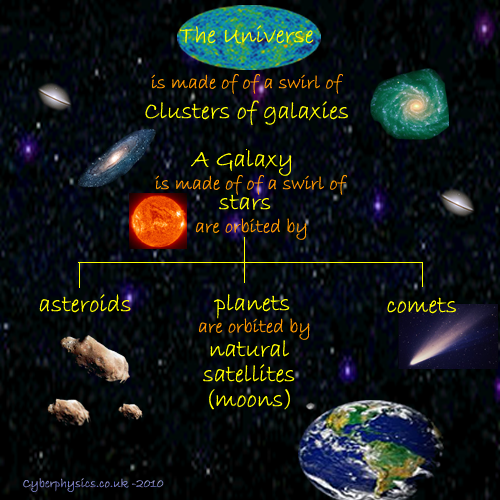The Universe The Universe is everything that exists in a material form. How big we say it is depends on how much we can actually 'see'.
Our Universe is made up of clusters of galaxies. The galaxies are not evenly spread out. Space is 'lumpy'. We are aware of about one hundred billion of glaxies. Each of the galaxies contains hundreds of billions of stars. The stars swirl around the centre of the galaxy and there is thought to be a black hole at the centre of each galaxy. Our galaxy is called the Milky Way. A star is the only thing in the universe that gives out its own light. We see other 'heavenly bodies' by reflected light, but stars give out their own light. The star does not burn (although poets often say they do!). A nuclear resction called nuclear fusion within that star produces the energy that the star gives out. You will learn about that in KS4. Our star is called Sol (or the Sun) Stars are often orbited by planets. Each day we are able to find out more about distant stars and to detect more planets orbiting them. Planets spin on their own axis - the time taken to spin once in its axis is called the planet's day. Planets 'go round' the star - they orbit it. The time taken for a planet to complete one orbit of the star is called its year. Planets take longer to complete an orbitital path the greater the distance they are from the star. In other words the further out the planet is the longer its year will be. Planets orbit in an 'oval shaped' path called an ellipse. Our planet (Earth) has an orbit that is almost circular. The star and all of the planets orbiting it are called that star's system. Our star is Sol so our system is the Solar system. In Star Wars (TM) Luke has to go to the Degobah system to find the planet that Yoda is on, You are expected to recall the names if the planets in our solar system in order. There are several mnemonics that enable you to do this:
*Pluto got demoted from the rank of planet to that of 'drawrf planet' in 2006, after being named as the 9th planet in our Solar System since 1930. See here. Planets are not the only things to orbit a star, comets and asteroids also are pulled into arbit around the star. Here is an interactive graphic that allows you to see the scale of the Universe. ...and here is the Universe according to Monty Python!
|
Follow me...
|






